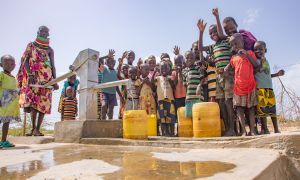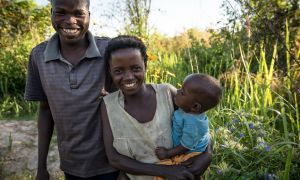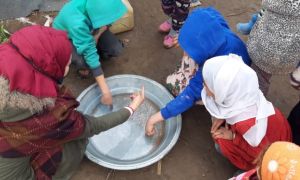
Read our 2023 annual report

Knowledge Hub
DRC WASH Consortium - Key documents
Key DRC WASH Consortium documents
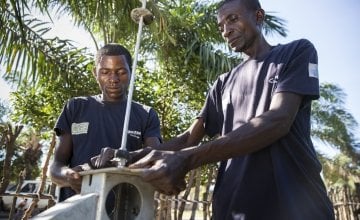
Summary
This page contains key articles and documents concerning the DRC WASH Consortium. The DRC WASH Consortium was a 5-year £30 million GBP rural WASH programme led by Concern Worldwide and funded by DFID in DRC. The Consortium comprised of the following agencies: Action Contre le Faim (ACF); Agency for Technical Cooperation and Development (ACTED); Catholic Relief Services (CRS); Concern Worldwide (as lead agency); and Solidarités International.
Overview
The DRC WASH Consortium was established in response to an opportunity to assist communities in the DRC to achieve sustainable improvements in their lives, thereby building resilience of communities faced with high morbidity and mortality due to problems linked to barriers of access to potable water, poor sanitation and improved hygiene. This was to be achieved through the following methodologies:
- Increasing coverage of sustainable and improved water, sanitation and hygiene practices;
- Promoting a common approach characterised by standardised WASH interventions across all agencies;
- Developing comprehensive, context specific solutions which address sustainability issues;
- Collaborating at micro, meso and macro levels - with communities, local governance structures, government institutions, public and private service providers to ensure sustainability, share knowledge, exchange information and learning and to advocate for change.
The theory of change underpinning the Consortium programme was that: By working with communities and local structures and linking these to Provincial and National stakeholders the DRC WASH consortium will increase sustainable coverage of WASH services in rural areas in the DRC, which will lead to improved health and productivity outcomes.
The DRC WASH Consortium had the following overall objectives:
Impact: Improved health and productivity through reduced morbidity and mortality resulting from water-related diseases in rural communities in the DRC.
Outcome: Sustainable and integrated environmental and household health and sanitation, which is adopted and managed by communities and integrated with local governance service provision institutions and strengthened locals partners and government.
These objectives were intended to be achieved through seven different outputs. The first five outputs focused on the benefits for communities while the final two were concerned with the Consortium’s wider influence on the WASH sector in DRC:
- Individuals demonstrate knowledge of the economic, social, health and environmental advantages of improved water, sanitation and hygiene for their communities at community and household level.
- Functioning governance institutions and service providers with increased capacity engage in WASH provision at the micro level.
- Representative, accountable and responsive Community Committees are established by community members.
- Communities have sustained and improved access to and availability of potable water
- Communities have improved and sustained access to sanitation facilities.
- Increased coordination, participation and planning at the macro, meso and micro levels between consortium members and governance structures, service providers and other stakeholders in the WASH sector.
- The Consortium produces and disseminates evidence for sustainable, community based solutions to WASH needs in the DRC.
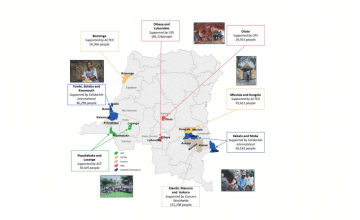
In total, the DRC WASH Consortium supported 612 communities and 656,000 beneficiaries in up to 16 health zones in rural DRC through a 12-step process, which lasted eighteen months in each village, followed by additional monitoring and evaluation for a further six months. Programme activities included the promotion of good hygiene behaviours through “Small Doable Actions”, support to the construction of household and institutional latrines, and the development of water points such as spring protections, protected wells, and boreholes.
The Consortium also worked with local health services, local authorities, the private sector and civil society to develop their capacity to support communities and ensure the sustainability of WASH services.
The Consortium aimed to use its experiences, innovation and research to produce and disseminate evidence for sustainable, community based solutions to WASH needs in the DRC.
Lessons Learned
Technical Guidance
Knowledge Matters Publications
This publication covers aid activities implemented with the financial assistance of DFID. The ideas, opinions and comments therein are entirely the responsibility of its author(s) and do not necessarily represent or reflect DFID policy.


